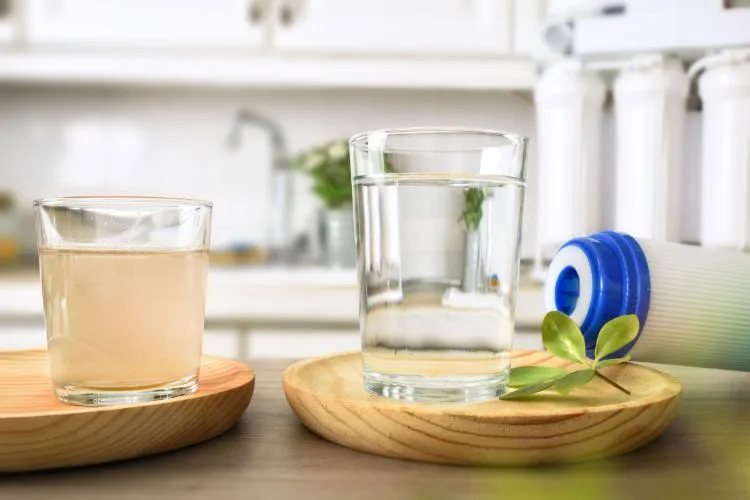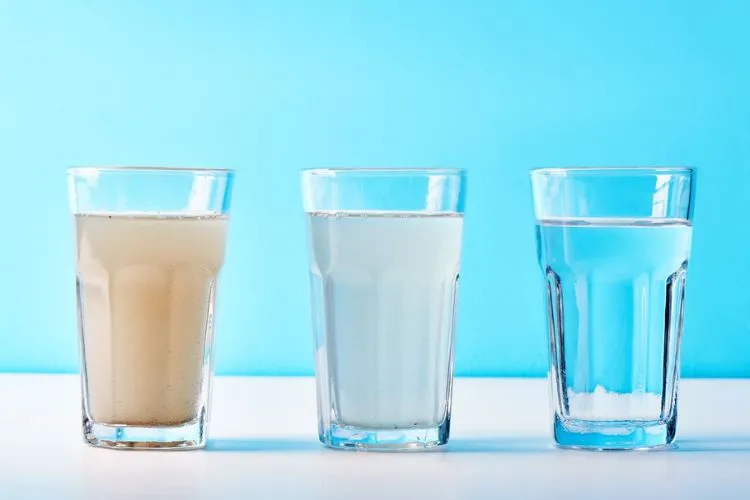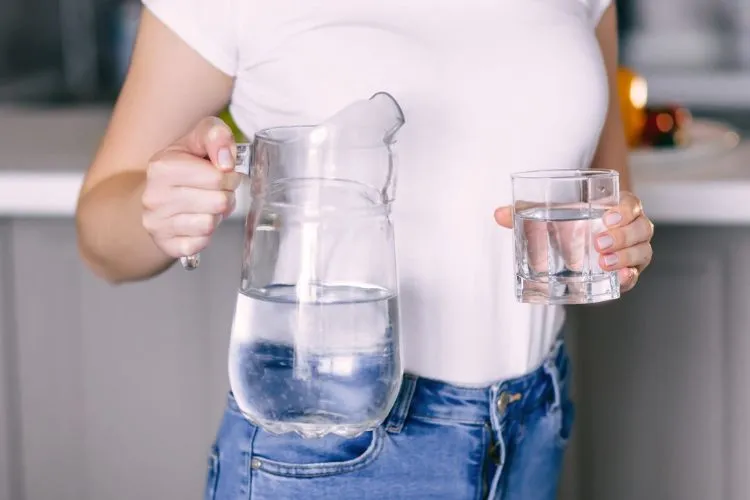Water filtration is a fundamental aspect of maintaining a healthy and tasteful drinking experience. Most of the time, we expect the result of our filtration efforts to be crystal-clear water.
However, it can be quite perplexing when, instead, the water coming out of our filters looks cloudy.
So, why is my filtered water cloudy? That’s the answer I was seeking a few months back.
In this article, I will help you all understand why this happens and how to fix it is essential for anyone looking to ensure the quality of their drinking water.

💦 What Does Cloudy Water Mean?
Cloudiness in water, often referred to as “white water” or “milky water,” can catch many by surprise. This condition generally has two main causes: air bubbles or particulates.
While it might alarm some, understanding the origins of this cloudiness can help demystify the issue and lead to quick solutions.
💦 Why Is My Filtered Water Cloudy?
Air Bubbles
One of the simplest explanations for cloudy water is the presence of air bubbles. These can become trapped during the filtration process or form due to changes in water pressure and temperature.
For instance, when water travels through pipes and into your home, variations in pressure and temperature can cause gases dissolved in the water to form bubbles. This is a normal occurrence and often clears on its own.
Sediment and Mineral Content
Another cause of cloudy water could be fine particulates or minerals that manage to pass through the filter. Minerals like calcium or magnesium are common in many water supplies and can lead to a condition known as temporary hardness, which can give water a milky appearance.
These particulates are generally harmless but can affect the aesthetics and sometimes the taste of your water.
Malfunctioning Filters
Sometimes, the culprit behind cloudy water can be a filter that’s not functioning as it should. Filters close to their end of life or those that have developed faults may not filter out particulates effectively.
Regular maintenance and timely replacement of filters are crucial to avoid such situations.
💦 How to Diagnose the Cause of Cloudiness

To determine whether trapped air or particulates are causing the cloudiness, you can perform a simple test. Fill a clear glass with water and set it on a flat surface. Watch to see if the cloudiness begins to clear from the bottom upwards.
This indicates air bubbles that are naturally rising and escaping from the water. If the cloudiness persists, it might be due to particulates.
💦 Solutions to Fix Cloudy Filtered Water
Dealing with Air Bubbles
If air bubbles are to blame, the solution is often as simple as waiting a few moments for the bubbles to escape naturally. Ensuring there are no leaks in your filtration system can also prevent air from getting into the water.
Addressing Sediment and Minerals
For water with high sediment or mineral content, considering a pre-filtration system might help. These systems can remove larger particulates before water goes through the primary filter, improving clarity.
Additionally, using a water softener can help manage the hardness of your water, reducing the chance of mineral-induced cloudiness.
Filter Maintenance and Replacement
The most effective way to ensure your filtered water remains clear is to maintain and replace your filters regularly. Following the manufacturer’s guidelines for filter maintenance helps prevent malfunctions that can lead to cloudy water.
💦 Preventative Measures to Keep Water Clear

Regular checks and understanding your water source go a long way in preventing cloudy water. Setting reminders for filter changes and performing regular system checks can help maintain water clarity.
Recognizing the signs of a failing filter early can prevent many instances of cloudiness.
💦 Advanced Solutions for Persistent Water Cloudiness
When basic troubleshooting for cloudy water fails to clear up the issue, it may be time to consider advanced solutions. Persistent cloudiness might indicate underlying problems that require professional intervention.
One effective approach is to install a multi-stage filtration system that combines mechanical, chemical, and sometimes biological filtration. These systems are particularly adept at handling a wide range of contaminants that single-stage filters might miss.
Additionally, consulting with a water treatment specialist who can conduct comprehensive water testing and tailor a filtration solution specifically for your water’s unique composition is advisable.
This level of customization ensures the most effective removal of impurities causing cloudiness.
frequently asked questions (FAQs)
How long should I wait for the air bubbles to clear from my filtered water?
Usually, it takes a few minutes for air bubbles to rise and escape, but waiting for about 30 minutes can ensure all bubbles have cleared.
What kind of pre-filtration system is best for high sediment levels in water?
A sediment filter, often designed to remove larger particles before they reach your primary filter, is ideal for water with high sediment levels.
Can cloudy water from the filter be harmful to my health?
Cloudy water caused by air bubbles is harmless. However, if particulates are the cause, it’s essential to identify their source. Most particulates are harmless, but some could suggest contamination.
Is it better to drink cloudy water or wait until it clears up?
While water with air bubbles is safe to drink, letting it sit until clear can improve the taste and appearance, making for a more pleasant drinking experience.
How often should I replace my water filter to prevent cloudy water?
The recommended frequency can vary based on your filter type and water usage, but generally, filters should be replaced every 2 to 6 months.
Conclusion:
While cloudy water from your filter can be concerning, it is often a problem that has easy fixes. Whether it’s trapped air, mineral content, or a filter in need of replacement, addressing the root cause can quickly restore your water’s clarity.
Regular maintenance and a good understanding of your water system can prevent most instances of cloudiness, ensuring your water is as clean and clear as expected.

Devon Shorts, a seasoned expert with over a decade of experience in water safety, shares valuable insights on this blog “Aqua Safety Plus”. Trust his expertise to keep your water clean and your family safe.
